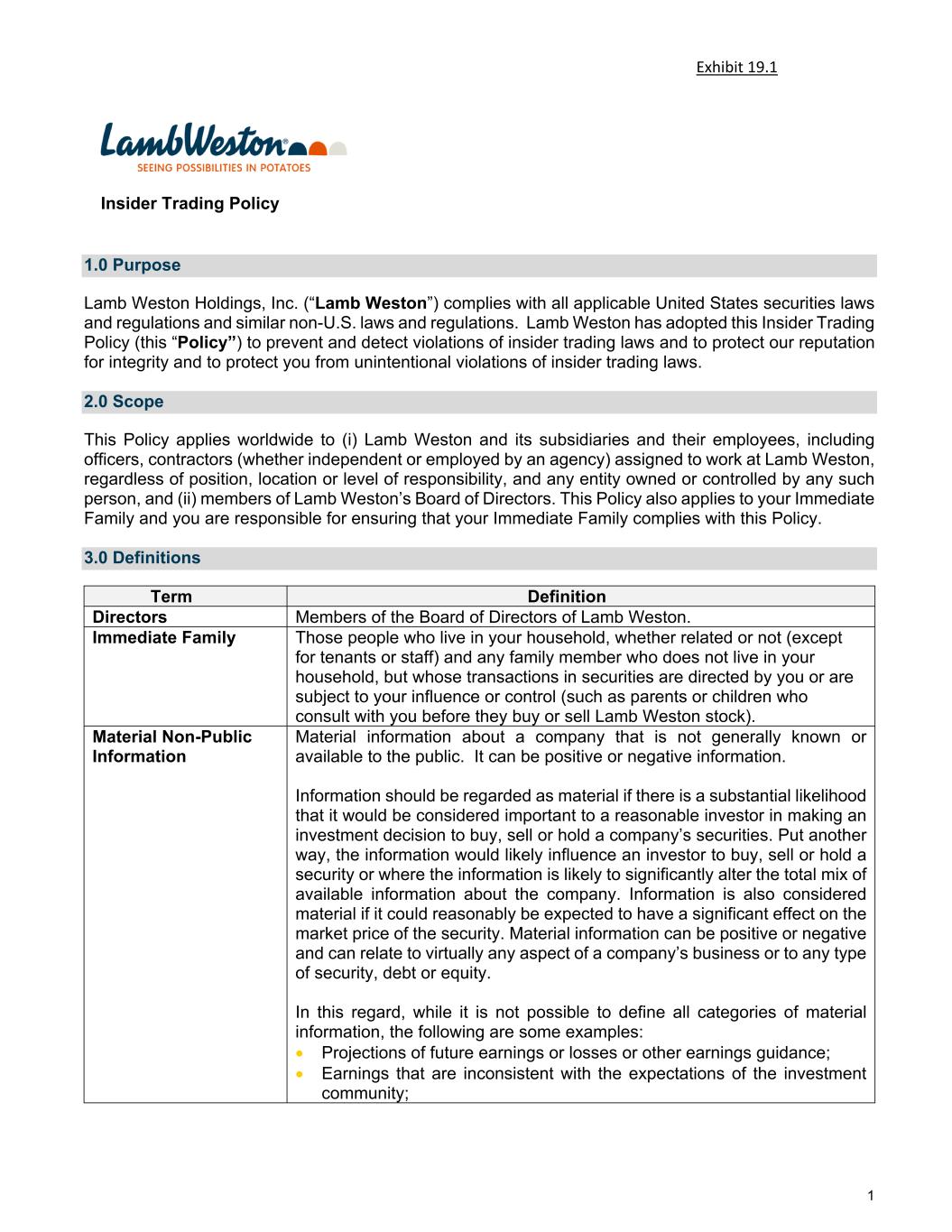
Exhibit 19.1 Insider Trading Policy 1 1.0 Purpose Lamb Weston Holdings, Inc. (“Lamb Weston”) complies with all applicable United States securities laws and regulations and similar non-U.S. laws and regulations. Lamb Weston has adopted this Insider Trading Policy (this “Policy”) to prevent and detect violations of insider trading laws and to protect our reputation for integrity and to protect you from unintentional violations of insider trading laws. 2.0 Scope This Policy applies worldwide to (i) Lamb Weston and its subsidiaries and their employees, including officers, contractors (whether independent or employed by an agency) assigned to work at Lamb Weston, regardless of position, location or level of responsibility, and any entity owned or controlled by any such person, and (ii) members of Lamb Weston’s Board of Directors. This Policy also applies to your Immediate Family and you are responsible for ensuring that your Immediate Family complies with this Policy. 3.0 Definitions Term Definition Directors Members of the Board of Directors of Lamb Weston. Immediate Family Those people who live in your household, whether related or not (except for tenants or staff) and any family member who does not live in your household, but whose transactions in securities are directed by you or are subject to your influence or control (such as parents or children who consult with you before they buy or sell Lamb Weston stock). Material Non-Public Information Material information about a company that is not generally known or available to the public. It can be positive or negative information. Information should be regarded as material if there is a substantial likelihood that it would be considered important to a reasonable investor in making an investment decision to buy, sell or hold a company’s securities. Put another way, the information would likely influence an investor to buy, sell or hold a security or where the information is likely to significantly alter the total mix of available information about the company. Information is also considered material if it could reasonably be expected to have a significant effect on the market price of the security. Material information can be positive or negative and can relate to virtually any aspect of a company’s business or to any type of security, debt or equity. In this regard, while it is not possible to define all categories of material information, the following are some examples: Projections of future earnings or losses or other earnings guidance; Earnings that are inconsistent with the expectations of the investment community;
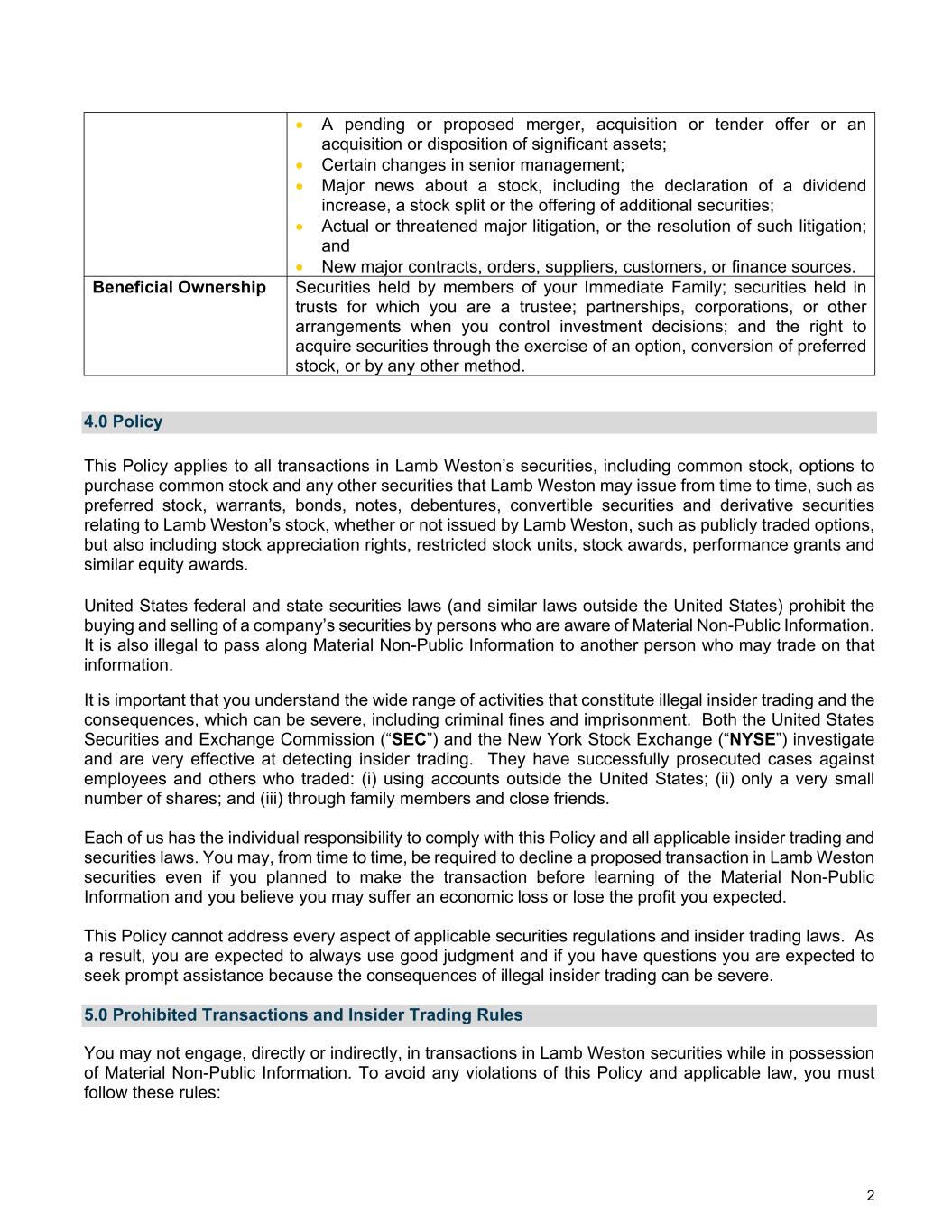
2 A pending or proposed merger, acquisition or tender offer or an acquisition or disposition of significant assets; Certain changes in senior management; Major news about a stock, including the declaration of a dividend increase, a stock split or the offering of additional securities; Actual or threatened major litigation, or the resolution of such litigation; and New major contracts, orders, suppliers, customers, or finance sources. Beneficial Ownership Securities held by members of your Immediate Family; securities held in trusts for which you are a trustee; partnerships, corporations, or other arrangements when you control investment decisions; and the right to acquire securities through the exercise of an option, conversion of preferred stock, or by any other method. 4.0 Policy This Policy applies to all transactions in Lamb Weston’s securities, including common stock, options to purchase common stock and any other securities that Lamb Weston may issue from time to time, such as preferred stock, warrants, bonds, notes, debentures, convertible securities and derivative securities relating to Lamb Weston’s stock, whether or not issued by Lamb Weston, such as publicly traded options, but also including stock appreciation rights, restricted stock units, stock awards, performance grants and similar equity awards. United States federal and state securities laws (and similar laws outside the United States) prohibit the buying and selling of a company’s securities by persons who are aware of Material Non-Public Information. It is also illegal to pass along Material Non-Public Information to another person who may trade on that information. It is important that you understand the wide range of activities that constitute illegal insider trading and the consequences, which can be severe, including criminal fines and imprisonment. Both the United States Securities and Exchange Commission (“SEC”) and the New York Stock Exchange (“NYSE”) investigate and are very effective at detecting insider trading. They have successfully prosecuted cases against employees and others who traded: (i) using accounts outside the United States; (ii) only a very small number of shares; and (iii) through family members and close friends. Each of us has the individual responsibility to comply with this Policy and all applicable insider trading and securities laws. You may, from time to time, be required to decline a proposed transaction in Lamb Weston securities even if you planned to make the transaction before learning of the Material Non-Public Information and you believe you may suffer an economic loss or lose the profit you expected. This Policy cannot address every aspect of applicable securities regulations and insider trading laws. As a result, you are expected to always use good judgment and if you have questions you are expected to seek prompt assistance because the consequences of illegal insider trading can be severe. 5.0 Prohibited Transactions and Insider Trading Rules You may not engage, directly or indirectly, in transactions in Lamb Weston securities while in possession of Material Non-Public Information. To avoid any violations of this Policy and applicable law, you must follow these rules:
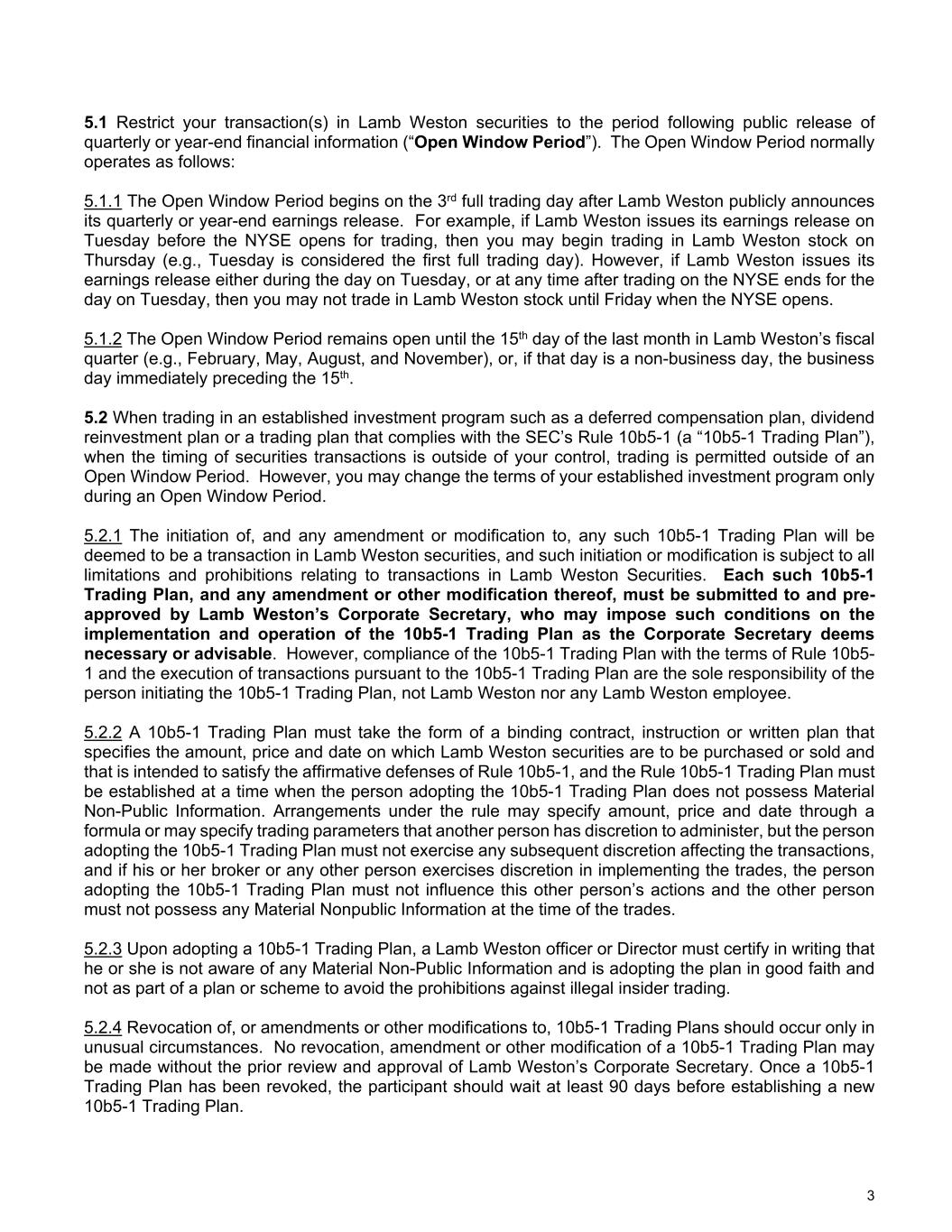
3 5.1 Restrict your transaction(s) in Lamb Weston securities to the period following public release of quarterly or year-end financial information (“Open Window Period”). The Open Window Period normally operates as follows: 5.1.1 The Open Window Period begins on the 3rd full trading day after Lamb Weston publicly announces its quarterly or year-end earnings release. For example, if Lamb Weston issues its earnings release on Tuesday before the NYSE opens for trading, then you may begin trading in Lamb Weston stock on Thursday (e.g., Tuesday is considered the first full trading day). However, if Lamb Weston issues its earnings release either during the day on Tuesday, or at any time after trading on the NYSE ends for the day on Tuesday, then you may not trade in Lamb Weston stock until Friday when the NYSE opens. 5.1.2 The Open Window Period remains open until the 15th day of the last month in Lamb Weston’s fiscal quarter (e.g., February, May, August, and November), or, if that day is a non-business day, the business day immediately preceding the 15th. 5.2 When trading in an established investment program such as a deferred compensation plan, dividend reinvestment plan or a trading plan that complies with the SEC’s Rule 10b5-1 (a “10b5-1 Trading Plan”), when the timing of securities transactions is outside of your control, trading is permitted outside of an Open Window Period. However, you may change the terms of your established investment program only during an Open Window Period. 5.2.1 The initiation of, and any amendment or modification to, any such 10b5-1 Trading Plan will be deemed to be a transaction in Lamb Weston securities, and such initiation or modification is subject to all limitations and prohibitions relating to transactions in Lamb Weston Securities. Each such 10b5-1 Trading Plan, and any amendment or other modification thereof, must be submitted to and pre- approved by Lamb Weston’s Corporate Secretary, who may impose such conditions on the implementation and operation of the 10b5-1 Trading Plan as the Corporate Secretary deems necessary or advisable. However, compliance of the 10b5-1 Trading Plan with the terms of Rule 10b5- 1 and the execution of transactions pursuant to the 10b5-1 Trading Plan are the sole responsibility of the person initiating the 10b5-1 Trading Plan, not Lamb Weston nor any Lamb Weston employee. 5.2.2 A 10b5-1 Trading Plan must take the form of a binding contract, instruction or written plan that specifies the amount, price and date on which Lamb Weston securities are to be purchased or sold and that is intended to satisfy the affirmative defenses of Rule 10b5-1, and the Rule 10b5-1 Trading Plan must be established at a time when the person adopting the 10b5-1 Trading Plan does not possess Material Non-Public Information. Arrangements under the rule may specify amount, price and date through a formula or may specify trading parameters that another person has discretion to administer, but the person adopting the 10b5-1 Trading Plan must not exercise any subsequent discretion affecting the transactions, and if his or her broker or any other person exercises discretion in implementing the trades, the person adopting the 10b5-1 Trading Plan must not influence this other person’s actions and the other person must not possess any Material Nonpublic Information at the time of the trades. 5.2.3 Upon adopting a 10b5-1 Trading Plan, a Lamb Weston officer or Director must certify in writing that he or she is not aware of any Material Non-Public Information and is adopting the plan in good faith and not as part of a plan or scheme to avoid the prohibitions against illegal insider trading. 5.2.4 Revocation of, or amendments or other modifications to, 10b5-1 Trading Plans should occur only in unusual circumstances. No revocation, amendment or other modification of a 10b5-1 Trading Plan may be made without the prior review and approval of Lamb Weston’s Corporate Secretary. Once a 10b5-1 Trading Plan has been revoked, the participant should wait at least 90 days before establishing a new 10b5-1 Trading Plan.
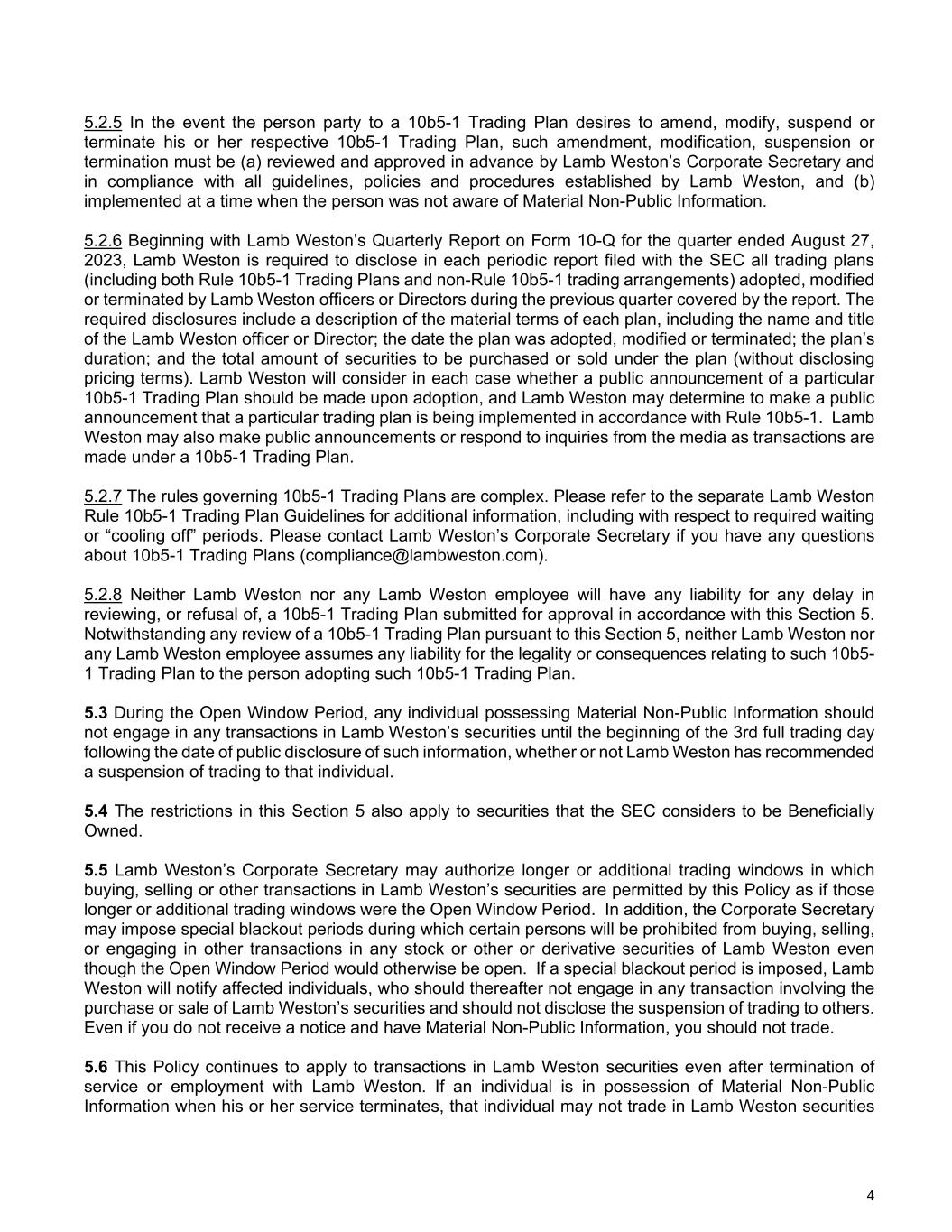
4 5.2.5 In the event the person party to a 10b5-1 Trading Plan desires to amend, modify, suspend or terminate his or her respective 10b5-1 Trading Plan, such amendment, modification, suspension or termination must be (a) reviewed and approved in advance by Lamb Weston’s Corporate Secretary and in compliance with all guidelines, policies and procedures established by Lamb Weston, and (b) implemented at a time when the person was not aware of Material Non-Public Information. 5.2.6 Beginning with Lamb Weston’s Quarterly Report on Form 10-Q for the quarter ended August 27, 2023, Lamb Weston is required to disclose in each periodic report filed with the SEC all trading plans (including both Rule 10b5-1 Trading Plans and non-Rule 10b5-1 trading arrangements) adopted, modified or terminated by Lamb Weston officers or Directors during the previous quarter covered by the report. The required disclosures include a description of the material terms of each plan, including the name and title of the Lamb Weston officer or Director; the date the plan was adopted, modified or terminated; the plan’s duration; and the total amount of securities to be purchased or sold under the plan (without disclosing pricing terms). Lamb Weston will consider in each case whether a public announcement of a particular 10b5-1 Trading Plan should be made upon adoption, and Lamb Weston may determine to make a public announcement that a particular trading plan is being implemented in accordance with Rule 10b5-1. Lamb Weston may also make public announcements or respond to inquiries from the media as transactions are made under a 10b5-1 Trading Plan. 5.2.7 The rules governing 10b5-1 Trading Plans are complex. Please refer to the separate Lamb Weston Rule 10b5-1 Trading Plan Guidelines for additional information, including with respect to required waiting or “cooling off” periods. Please contact Lamb Weston’s Corporate Secretary if you have any questions about 10b5-1 Trading Plans (compliance@lambweston.com). 5.2.8 Neither Lamb Weston nor any Lamb Weston employee will have any liability for any delay in reviewing, or refusal of, a 10b5-1 Trading Plan submitted for approval in accordance with this Section 5. Notwithstanding any review of a 10b5-1 Trading Plan pursuant to this Section 5, neither Lamb Weston nor any Lamb Weston employee assumes any liability for the legality or consequences relating to such 10b5- 1 Trading Plan to the person adopting such 10b5-1 Trading Plan. 5.3 During the Open Window Period, any individual possessing Material Non-Public Information should not engage in any transactions in Lamb Weston’s securities until the beginning of the 3rd full trading day following the date of public disclosure of such information, whether or not Lamb Weston has recommended a suspension of trading to that individual. 5.4 The restrictions in this Section 5 also apply to securities that the SEC considers to be Beneficially Owned. 5.5 Lamb Weston’s Corporate Secretary may authorize longer or additional trading windows in which buying, selling or other transactions in Lamb Weston’s securities are permitted by this Policy as if those longer or additional trading windows were the Open Window Period. In addition, the Corporate Secretary may impose special blackout periods during which certain persons will be prohibited from buying, selling, or engaging in other transactions in any stock or other or derivative securities of Lamb Weston even though the Open Window Period would otherwise be open. If a special blackout period is imposed, Lamb Weston will notify affected individuals, who should thereafter not engage in any transaction involving the purchase or sale of Lamb Weston’s securities and should not disclose the suspension of trading to others. Even if you do not receive a notice and have Material Non-Public Information, you should not trade. 5.6 This Policy continues to apply to transactions in Lamb Weston securities even after termination of service or employment with Lamb Weston. If an individual is in possession of Material Non-Public Information when his or her service terminates, that individual may not trade in Lamb Weston securities
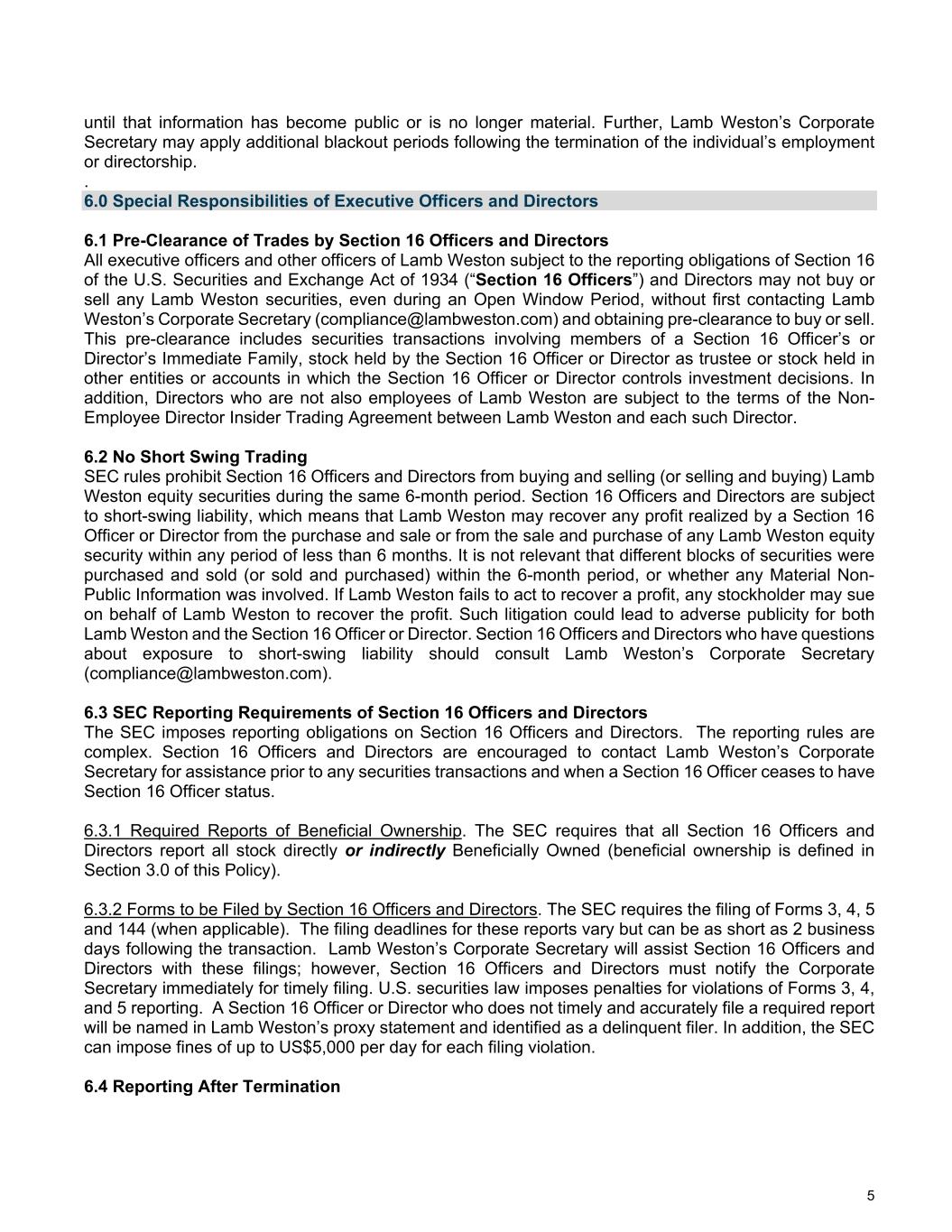
5 until that information has become public or is no longer material. Further, Lamb Weston’s Corporate Secretary may apply additional blackout periods following the termination of the individual’s employment or directorship. . 6.0 Special Responsibilities of Executive Officers and Directors 6.1 Pre-Clearance of Trades by Section 16 Officers and Directors All executive officers and other officers of Lamb Weston subject to the reporting obligations of Section 16 of the U.S. Securities and Exchange Act of 1934 (“Section 16 Officers”) and Directors may not buy or sell any Lamb Weston securities, even during an Open Window Period, without first contacting Lamb Weston’s Corporate Secretary (compliance@lambweston.com) and obtaining pre-clearance to buy or sell. This pre-clearance includes securities transactions involving members of a Section 16 Officer’s or Director’s Immediate Family, stock held by the Section 16 Officer or Director as trustee or stock held in other entities or accounts in which the Section 16 Officer or Director controls investment decisions. In addition, Directors who are not also employees of Lamb Weston are subject to the terms of the Non- Employee Director Insider Trading Agreement between Lamb Weston and each such Director. 6.2 No Short Swing Trading SEC rules prohibit Section 16 Officers and Directors from buying and selling (or selling and buying) Lamb Weston equity securities during the same 6-month period. Section 16 Officers and Directors are subject to short-swing liability, which means that Lamb Weston may recover any profit realized by a Section 16 Officer or Director from the purchase and sale or from the sale and purchase of any Lamb Weston equity security within any period of less than 6 months. It is not relevant that different blocks of securities were purchased and sold (or sold and purchased) within the 6-month period, or whether any Material Non- Public Information was involved. If Lamb Weston fails to act to recover a profit, any stockholder may sue on behalf of Lamb Weston to recover the profit. Such litigation could lead to adverse publicity for both Lamb Weston and the Section 16 Officer or Director. Section 16 Officers and Directors who have questions about exposure to short-swing liability should consult Lamb Weston’s Corporate Secretary (compliance@lambweston.com). 6.3 SEC Reporting Requirements of Section 16 Officers and Directors The SEC imposes reporting obligations on Section 16 Officers and Directors. The reporting rules are complex. Section 16 Officers and Directors are encouraged to contact Lamb Weston’s Corporate Secretary for assistance prior to any securities transactions and when a Section 16 Officer ceases to have Section 16 Officer status. 6.3.1 Required Reports of Beneficial Ownership. The SEC requires that all Section 16 Officers and Directors report all stock directly or indirectly Beneficially Owned (beneficial ownership is defined in Section 3.0 of this Policy). 6.3.2 Forms to be Filed by Section 16 Officers and Directors. The SEC requires the filing of Forms 3, 4, 5 and 144 (when applicable). The filing deadlines for these reports vary but can be as short as 2 business days following the transaction. Lamb Weston’s Corporate Secretary will assist Section 16 Officers and Directors with these filings; however, Section 16 Officers and Directors must notify the Corporate Secretary immediately for timely filing. U.S. securities law imposes penalties for violations of Forms 3, 4, and 5 reporting. A Section 16 Officer or Director who does not timely and accurately file a required report will be named in Lamb Weston’s proxy statement and identified as a delinquent filer. In addition, the SEC can impose fines of up to US$5,000 per day for each filing violation. 6.4 Reporting After Termination
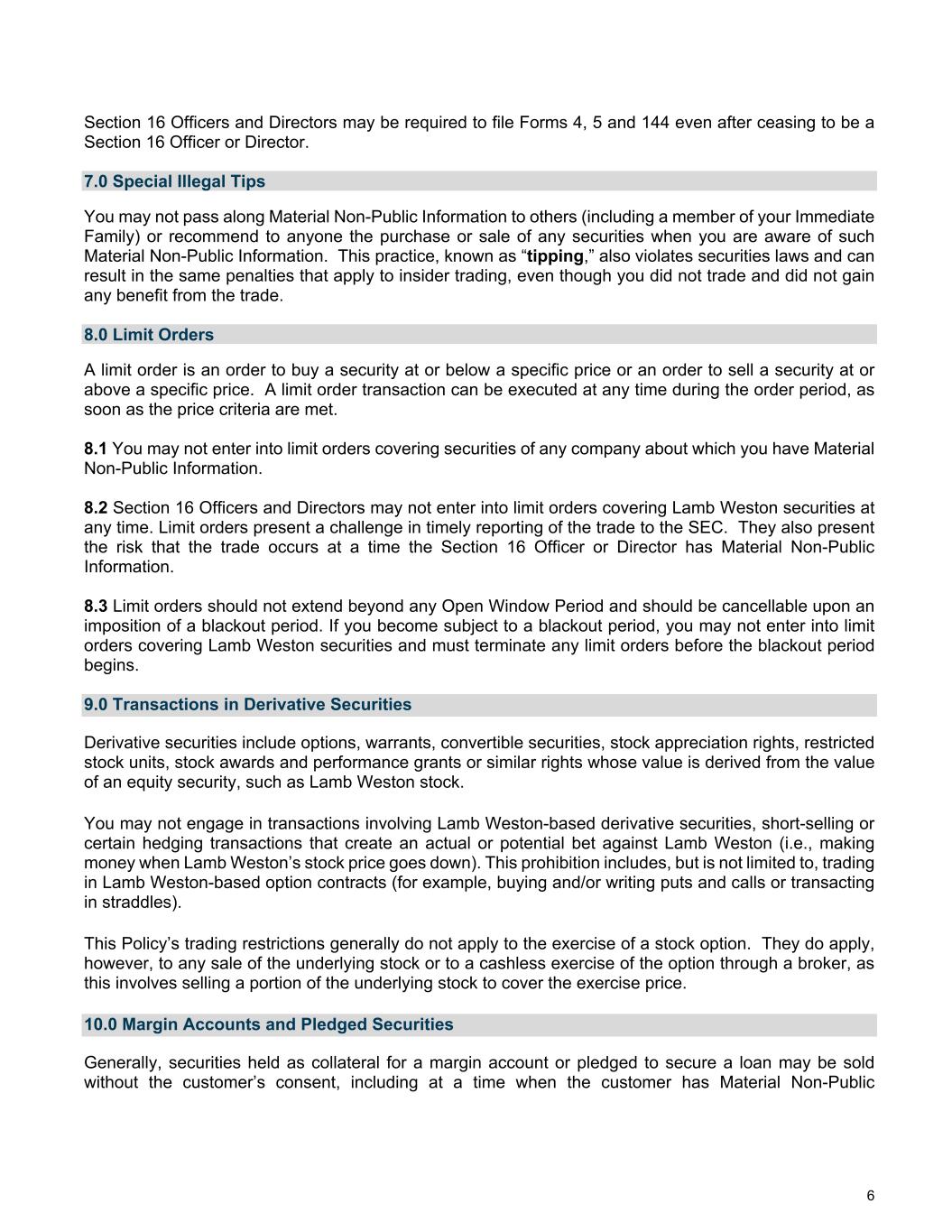
6 Section 16 Officers and Directors may be required to file Forms 4, 5 and 144 even after ceasing to be a Section 16 Officer or Director. 7.0 Special Illegal Tips You may not pass along Material Non-Public Information to others (including a member of your Immediate Family) or recommend to anyone the purchase or sale of any securities when you are aware of such Material Non-Public Information. This practice, known as “tipping,” also violates securities laws and can result in the same penalties that apply to insider trading, even though you did not trade and did not gain any benefit from the trade. 8.0 Limit Orders A limit order is an order to buy a security at or below a specific price or an order to sell a security at or above a specific price. A limit order transaction can be executed at any time during the order period, as soon as the price criteria are met. 8.1 You may not enter into limit orders covering securities of any company about which you have Material Non-Public Information. 8.2 Section 16 Officers and Directors may not enter into limit orders covering Lamb Weston securities at any time. Limit orders present a challenge in timely reporting of the trade to the SEC. They also present the risk that the trade occurs at a time the Section 16 Officer or Director has Material Non-Public Information. 8.3 Limit orders should not extend beyond any Open Window Period and should be cancellable upon an imposition of a blackout period. If you become subject to a blackout period, you may not enter into limit orders covering Lamb Weston securities and must terminate any limit orders before the blackout period begins. 9.0 Transactions in Derivative Securities Derivative securities include options, warrants, convertible securities, stock appreciation rights, restricted stock units, stock awards and performance grants or similar rights whose value is derived from the value of an equity security, such as Lamb Weston stock. You may not engage in transactions involving Lamb Weston-based derivative securities, short-selling or certain hedging transactions that create an actual or potential bet against Lamb Weston (i.e., making money when Lamb Weston’s stock price goes down). This prohibition includes, but is not limited to, trading in Lamb Weston-based option contracts (for example, buying and/or writing puts and calls or transacting in straddles). This Policy’s trading restrictions generally do not apply to the exercise of a stock option. They do apply, however, to any sale of the underlying stock or to a cashless exercise of the option through a broker, as this involves selling a portion of the underlying stock to cover the exercise price. 10.0 Margin Accounts and Pledged Securities Generally, securities held as collateral for a margin account or pledged to secure a loan may be sold without the customer’s consent, including at a time when the customer has Material Non-Public
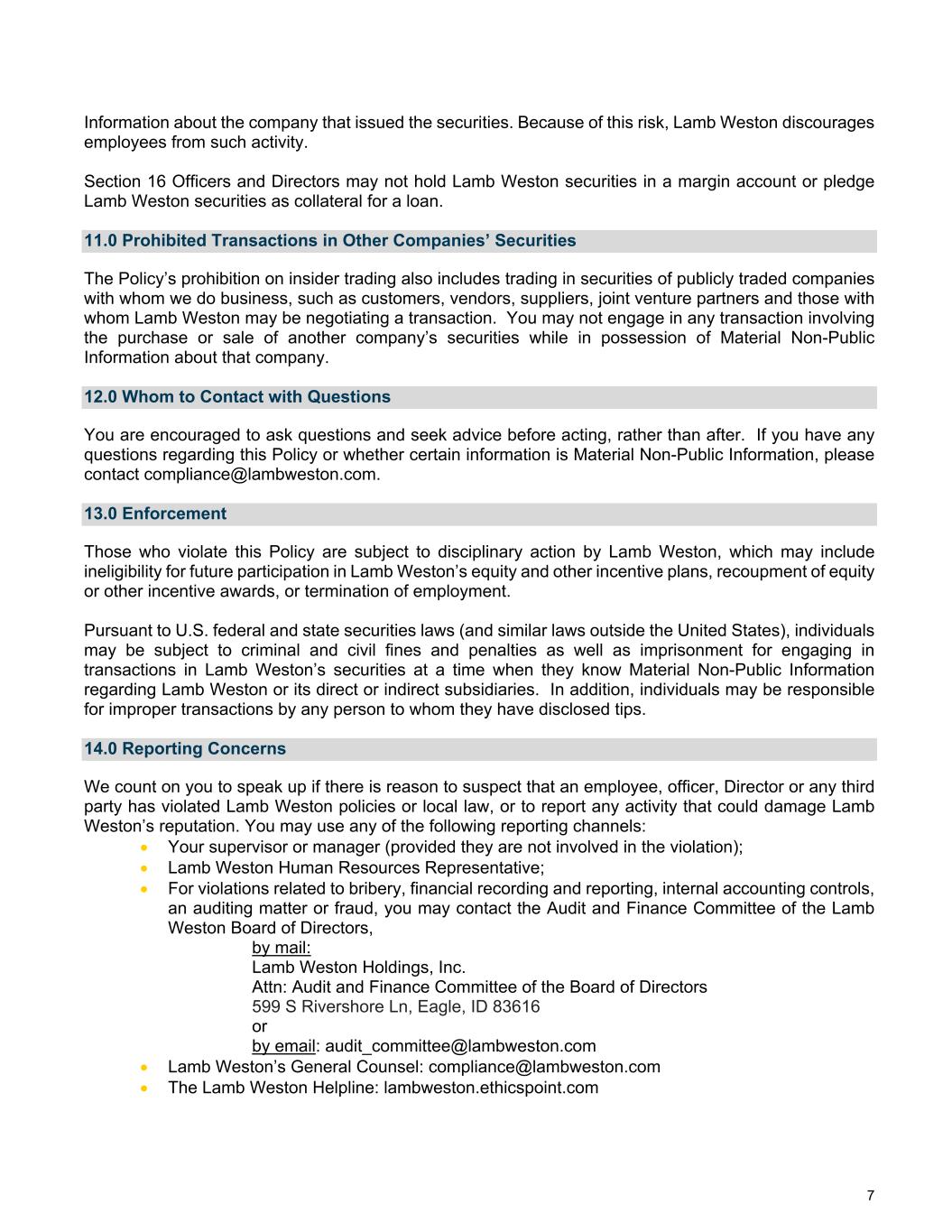
7 Information about the company that issued the securities. Because of this risk, Lamb Weston discourages employees from such activity. Section 16 Officers and Directors may not hold Lamb Weston securities in a margin account or pledge Lamb Weston securities as collateral for a loan. 11.0 Prohibited Transactions in Other Companies’ Securities The Policy’s prohibition on insider trading also includes trading in securities of publicly traded companies with whom we do business, such as customers, vendors, suppliers, joint venture partners and those with whom Lamb Weston may be negotiating a transaction. You may not engage in any transaction involving the purchase or sale of another company’s securities while in possession of Material Non-Public Information about that company. 12.0 Whom to Contact with Questions You are encouraged to ask questions and seek advice before acting, rather than after. If you have any questions regarding this Policy or whether certain information is Material Non-Public Information, please contact compliance@lambweston.com. 13.0 Enforcement Those who violate this Policy are subject to disciplinary action by Lamb Weston, which may include ineligibility for future participation in Lamb Weston’s equity and other incentive plans, recoupment of equity or other incentive awards, or termination of employment. Pursuant to U.S. federal and state securities laws (and similar laws outside the United States), individuals may be subject to criminal and civil fines and penalties as well as imprisonment for engaging in transactions in Lamb Weston’s securities at a time when they know Material Non-Public Information regarding Lamb Weston or its direct or indirect subsidiaries. In addition, individuals may be responsible for improper transactions by any person to whom they have disclosed tips. 14.0 Reporting Concerns We count on you to speak up if there is reason to suspect that an employee, officer, Director or any third party has violated Lamb Weston policies or local law, or to report any activity that could damage Lamb Weston’s reputation. You may use any of the following reporting channels: Your supervisor or manager (provided they are not involved in the violation); Lamb Weston Human Resources Representative; For violations related to bribery, financial recording and reporting, internal accounting controls, an auditing matter or fraud, you may contact the Audit and Finance Committee of the Lamb Weston Board of Directors, by mail: Lamb Weston Holdings, Inc. Attn: Audit and Finance Committee of the Board of Directors 599 S Rivershore Ln, Eagle, ID 83616 or by email: audit_committee@lambweston.com Lamb Weston’s General Counsel: compliance@lambweston.com The Lamb Weston Helpline: lambweston.ethicspoint.com
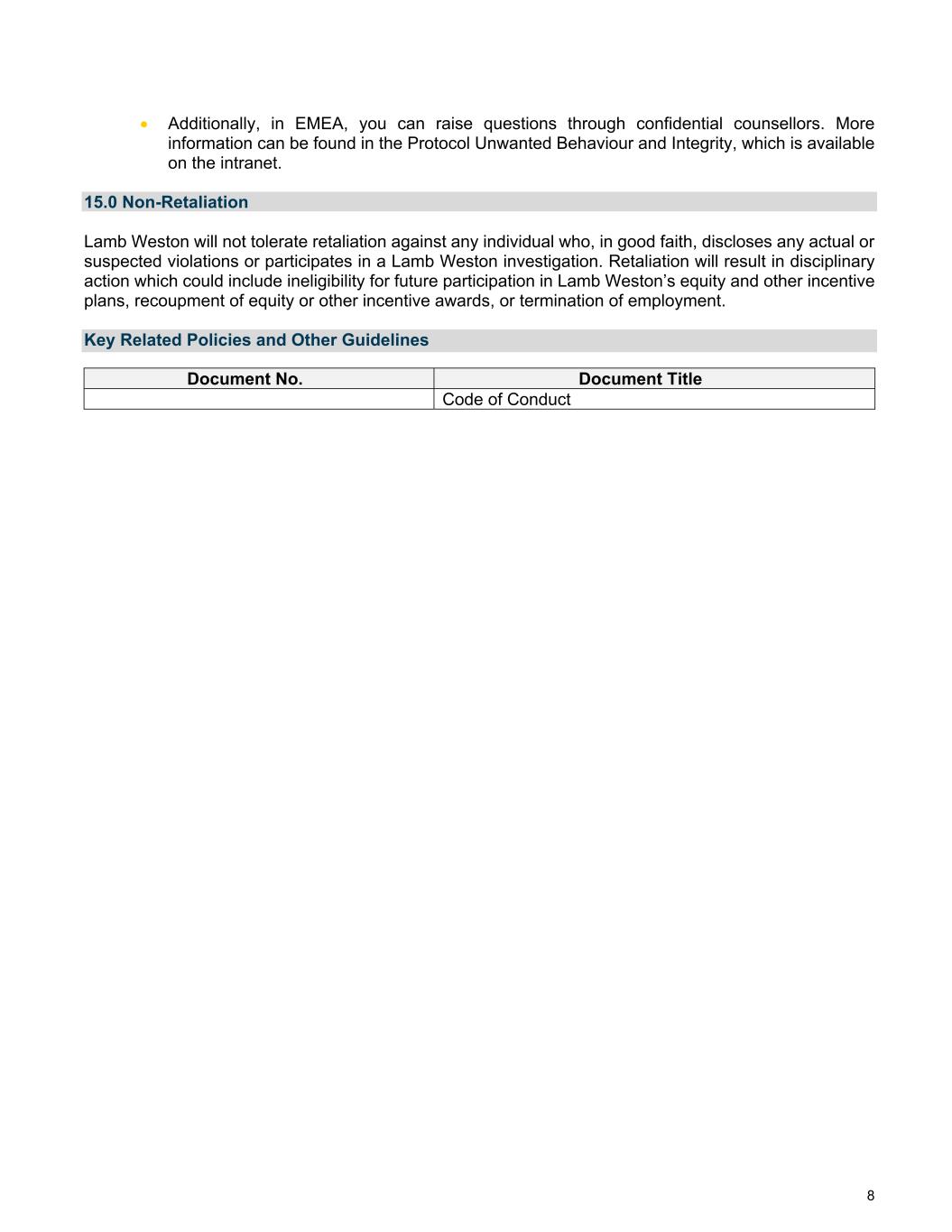
8 Additionally, in EMEA, you can raise questions through confidential counsellors. More information can be found in the Protocol Unwanted Behaviour and Integrity, which is available on the intranet. 15.0 Non-Retaliation Lamb Weston will not tolerate retaliation against any individual who, in good faith, discloses any actual or suspected violations or participates in a Lamb Weston investigation. Retaliation will result in disciplinary action which could include ineligibility for future participation in Lamb Weston’s equity and other incentive plans, recoupment of equity or other incentive awards, or termination of employment. Key Related Policies and Other Guidelines Document No. Document Title Code of Conduct